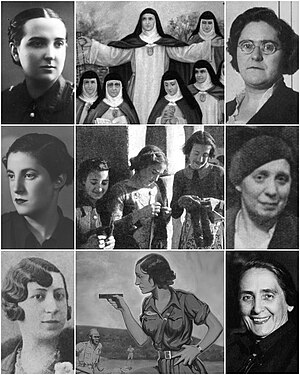| Part of a series on |
| Women in the Spanish Civil War |
|---|
 |
|
|
Women in modern pre-Second Republic Spain were marginalized by society, with very few legal rights. Pre-1900s, the most important feminists were in Spain were Teresa Claramunt and Teresa Mañe, who drew inspiration from foreign feminists. Prior to the 1900, literacy rates for women were at 10%. Education for women was primarily being pushed by freethinkers. This period saw low percentages of women in the workforce, with industrialization having failed to bring women into the labor market. The most female industry with the greatest women's led labor movement was the tobacco industry.
The 1900s saw Spanish feminism begin to flourish, but different than its North American and British sisters in that Spanish feminist took on a leftist perspective. Some of the most important feminists of this period included Clara Campoamor, Virginia González and Carmen de Burgos. Partido Socialista Obrero Español would be one of the most important political parties for women in this period, though the party would continually disappoint and alienate its female members.
The World War I period saw the most active political activity around consumer related activities, like goods and services shortages, high rents and high prices of consumer goods. The first female only union was created in this period, when female tobacco workers unionized in 1918 and proved successful in doubling their wages.
Starting in the 1920s, the efforts of women to get the right to vote intensified as part of a broader western movement that saw women demanding equal rights. Women's literacy was also increasing. Socialists continued to ignore women. Communist Dolores Ibárruri joined the party and soon became the head of its Women's Commission.
© MMXXIII Rich X Search. We shall prevail. All rights reserved. Rich X Search
